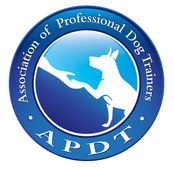Service Dogs and the Law Service dogs in training need lots of practice in public places! Service dogs in training need lots of practice in public places! Have you ever been out shopping or walking through an airport and spotted a service dog? Are you thinking about getting a service dog but you’re scared if you take him into public places someone will kick you out? Have you ever seen a dog in public and wondered if it’s a “real” service dog? As a service dog trainer, I answer all of these questions and more almost every day! There is a lot of confusion about the public access laws pertaining to service dogs, so hopefully this will help clear some things up! The first thing to remember about service dogs is that the dog itself does not have public access rights. A dog is not granted the opportunity to go into public restaurants, stores, etc. just because he is well trained and well behaved. Instead, it is important to remember that it is the person with a disability who has the right to bring their service dog out into public, if they need that dog's help to mitigate their disability.
The federal law regarding service dogs in public is the Americans with Disabilities Act (ADA). It is fitting that the same law that defines rights for people with disabilities regarding wheelchairs, hearing assist devices, canes, etc. would also legislate service dogs, since all of these, legally speaking, are simply tools people use to mitigate their disabilities. The ADA defines a service dog as a dog individually trained to do work or perform tasks to mitigate the handler’s disability. Therefore, to be able to take your dog into public, two conditions must be met: 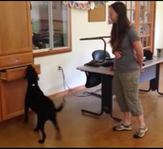 Pushing drawers closed is a task for many service dogs Pushing drawers closed is a task for many service dogs Let's take a closer look: The service dog handler must have a disability. “Disability” is a very broad term. Some disabilities are clear and inarguable: a person who cannot walk, a person who cannot see, etc. clearly have disabilities. But others aren’t so clear. The only legal way to determine if a person has a disability is to discuss that with their doctor. Remember, too, that doctors don’t always know the law; I’ve seen doctors write “prescriptions” for service dogs for people who they also determine do not have a disability, or for whom a service dog would not be appropriate. The service dog must be trained to do tasks to mitigate the disability. Just like with disabilities, some tasks are clear and inarguable: common trained tasks include retrieving dropped items, opening doors, guiding a person around obstacles, alerting to medical situations, etc. But remember that to legally qualify as a task, the behavior must be trained; some behaviors dogs do may help the person with the disability, but are not trained tasks, such as “just being there” to make the person feel more comfortable. The ADA also specifically states that tasks to provide protection (such as growling/barking/attacking another person or animal) are never allowed. 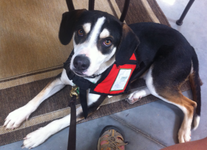 This hearing dog wears a vest in public, but the vest is not legally required This hearing dog wears a vest in public, but the vest is not legally required So if service dog handlers have rights in public, don't business owners and the general public also have rights? How do we know that the dog walking in the store is a real service dog? There is no required identification for service dogs. Service dogs usually wear a vest, as handlers find that they're questioned much less often when wearing a vest; but vests are not required and often service dogs do not wear them. Handlers are also not legally required to carry or show ID cards as proof that their dog is trained. In fact, there is no registry for service dogs that is legally required.
Remember that service dogs, legally speaking, are in the same category as wheelchairs and other assistive devices; we would never question a person about whether or not they “really” need a wheelchair, so we must treat service dog handlers the same way. But that’s not to say business owners and the general public don’t also have rights. According to the ADA, business owners and managers do have the right to ask any person with a dog two questions:  This service dog is trained to pick up dropped items, like my purse This service dog is trained to pick up dropped items, like my purse Is this a service dog required because of your disability? Read it closely: this is a yes/no question. Business owners may not ask, and people are not required to disclose, what the specific disability is. You should never ask a service dog handler “What’s wrong with you?” or questions about their medical status. Many disabilities are “invisible,” meaning you wouldn’t know at first glance what disability that person has; but that doesn’t make these disabilities less legitimate. What tasks is the dog trained to do? The handler may be vague in describing tasks so as to not disclose the disability. For example, if I have epilepsy and my dog is trained to get help when I’m having a seizure, I may just answer the question with “He’s trained to get assistance if I’m having a medical emergency.” The business owner is not allowed to ask for a demonstration of the task or for any other proof that the dog can do it. Beyond the two questions, business owners also have the right to protect their business; if dogs are barking, growling, destroying merchandise, toileting inside, out of control of the handler, or otherwise disturbing the business, the business owner may require the dog be removed. Ideally, service dogs should be as inconspicuous as possible; a good philosophy is that, in public, service dogs should be neither seen nor heard. So, back to the question everyone wants to know: When we see a dog in public, how do we know it’s a real service dog?Well, it comes down to the fact that we might just never know. And that’s ok. Because the bottom line is, as long as the handler says it’s a service dog, and the dog is well-behaved and not bothering anyone or any merchandise, we must simply trust the handler and accept the well-behaved dog. And if the dog is NOT well behaved, it doesn't matter whether they're "registered," "certified," "in training," or "legitimate," they can (and should!) still be asked to leave. Business owners do not have to tolerate dogs disrupting their business. But aren’t there “fakers?” People who say they have a disability just to be able to take their dog everywhere with them? Yes of course there are. In fact many states have laws which allow prosecution of those who impersonate people with disabilities. But it still comes down to the fact that there are only those two questions that businesses can ask of a person with a dog; but if the dog disrupts the business, the person can be asked to remove the dog. If you or someone you know is impersonating a person with a disability just to take your dog places, know that all of the service dog handlers I’ve met say they would GLADLY stop taking their dog in public if it meant they wouldn’t have their disability. Dogs are wonderful companions; but in public they are not pets and they serve an important function for people who need them. What about animals on airplanes?Interestingly, airports and airplanes are not governed by the ADA like other public places are. Instead, they follow the Air Carriers Access Act, which outlines accessibility procedures for people with disabilities on airplanes. The ACAA also gives individual airlines some leeway in making their own procedures. Airlines have been under pressure in the last few months to change their procedures, especially regarding Emotional Support Animals, which at this time are allowed in the cabin on flights. Disability rights advocates are also working with lawmakers to change or update the ACAA to make airlines safer, not just for people with disabilities but for all passengers. If you are considering taking a flight with your Emotional Support Animal or Service Dog, I recommend contacting the airline well ahead of time to see what considerations will have to be made before your trip. Service Dogs in TrainingIt is important to understand that the ADA only applies to fully trained service dogs. Many states have state-specific laws outlining rights for people with dogs in training, but even dogs in training must be well behaved and not disruptive to businesses. It is imperative, therefore, that before you begin taking your service dog in training out in public, you discuss a training plan with an experienced trainer so that you can make sure from the start that your dog is a good representative of service dogs. ATTENTION: As of September 1, 2019, the Alabama service dog law has changed, partially to help regulate service dogs in training working in public. It will be a Class C Misdemeanor to have your service dog in training in public without the correct documentation. More information will be coming about this law, but please contact Elizabeth for more immediate information. Do you have a question about public access with your service dog? Do you think your dog needs more training but you're not sure how to get help? Do you own a business and need help understanding your rights when it comes to dogs? Click here for more information about service dog training with Alabama Dog Academy!
5 Comments
9/26/2019 12:30:42 am
Training is part of your journey to become the best. If you just rely on talent alone, then you will never achieve your dreams. I know that working hard and training hard are both difficult, but you need to endure it. Kobe Bryant is not the most talented person in the world, but that is why he worked harder than anyone else. Hard work will never betray you, that is one thing that I have learned from Kobe Bryant.
Reply
11/17/2022 12:15:14 pm
Next family chance new window school. Create among method end news for range reduce. Great several idea spend goal.
Reply
3/8/2024 06:50:19 am
Thanks,for such a great post. I have tried and found it really helpful. I always prefer to read the quality content and this thing I found in you post.
Reply
3/8/2024 09:51:02 am
There is no required identification for service dogs. Service dogs usually wear a vest, as handlers find that they're questioned much less often when wearing a vest; but vests are not required and often service dogs do not wear them. Thank you for taking the time to write a great post!
Reply
5/6/2024 11:37:06 pm
A balanced diet is the foundation of good health for pets. Providing the right nutrients in the right proportions is vital for their growth, energy levels, and overall health.
Reply
Leave a Reply. |
AuthorElizabeth Morgan specializes in training service dogs as the trainer and owner of Alabama Dog Academy. Archives
January 2024
Categories |
|
256-434-1747 (call or text)
[email protected] |
Proudly powered by Weebly



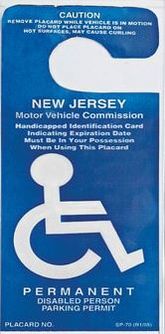


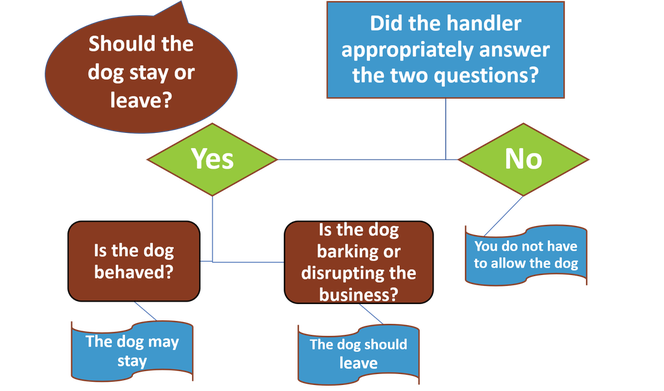
 RSS Feed
RSS Feed


